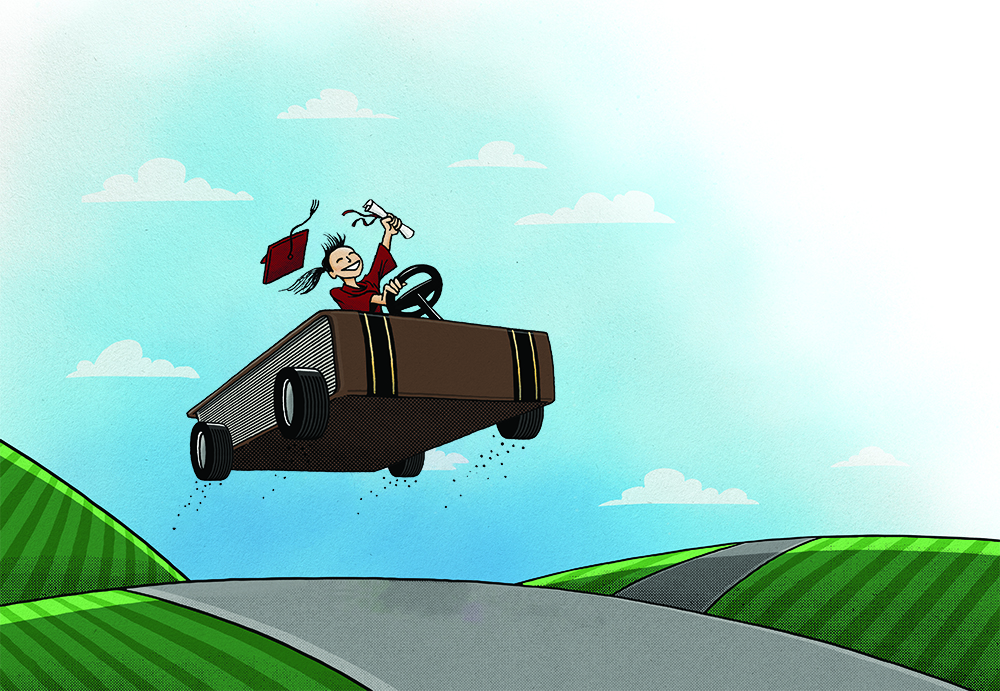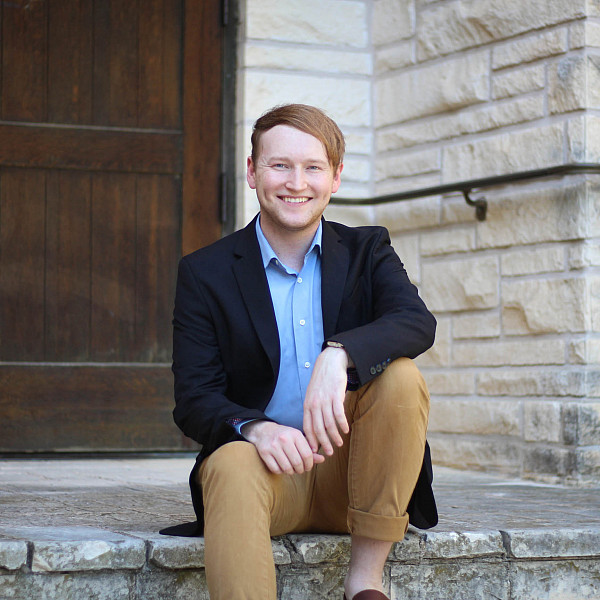English
Shifting Narratives
April 28, 2020
April 28, 2020
Open gallery

If English majors relied on novels to gauge their career opportunities, they’d be drafting a eulogy between classes. Consider Patrick Anderson Jr.’s Quarter Life Crisis, in which a female protagonist replies with leveled eyes to a colleague’s question about making more money, “Linus, I was an English major.” And in Celine, Peter Heller describes a difficult character as “probably a frustrated English major who graduated from college qualified to drive a cab.”
Luckily for graduates of Southwestern, the faculty understands that this age-old myth is just that. Studies have shown that the skills students develop in English and other humanities majors set them up well for lucrative careers in any area that requires communication and critical thinking, including sales, training, and management.
Seeing major value
Mia Zozobrado ’17 found this out her first year at the university. The Houston-area native recalls being nervous about job prospects in spring 2013, when she arrived on campus, and feeling insecure about her smarts after the first week of classes. A trip to SU’s Center for Career & Professional Development (CCPD) helped put her mind at ease on both counts as staff shared surveys about the career paths English majors had pursued—everything from being a registered behavioral technician or serving as a legislative assistant for a state representative to being a technical-support specialist.
“There was such a diversity of where students landed following their time at Southwestern,” says Zozobrado, who is now a content writer for a marketing agency that serves the building industry. “It helped put into context how I could shape the English degree trajectory a little bit differently [from the story you typically hear].”
Surveys have also shown that the pay gap between many college majors shrinks over time. For instance, a 2014 analysis by the Association of American Colleges & Universities showed that, by their mid-50s, humanities and social science graduates make slightly more than those in vocational fields like nursing and accounting (by about 3%, earning an average annual salary of $66,185).
Given the way career paths often twist and turn these days, having broad job skills also has benefits, notes Morgan Patterson ’17, an assistant buyer of merchandise for the online site Zulily. “My English and history degrees set me up well to be able to problem-solve, essentially,” she shares. “I was expected on a regular basis to research, to think about a problem, to come up with a solution to that problem, and then to write eloquently about it and to communicate that to other people—all of which are tremendously valuable skills, no matter what.”
Faculty such as Professor Helene Meyers, who chairs the English Department, and staff at the CCPD also work hard to provide humanities students with the mindset and expertise to not get pigeonholed into entry-level jobs.
During Zozobrado’s first-year visit to the CCPD, for instance, she noted that Alexandra Anderson, the Center’s senior associate director, pushed back against the narrative that an English degree doomed graduates to underemployment. As Anderson says, “[Employability] has less to do with exactly what you majored in and more to do with the whole package you’ve put together: the intellectual development and growth that you’ve gained, as exhibited by your academic performance to some degree, as well as out-of-class experiences that can include internships, which build skills.”
The positive approach to careers that SU faculty and staff take doesn’t mean they convey a Pollyanna outlook about career success. One study, for instance, suggests that nearly half of all college graduates take a first job that doesn’t require their degree. A particular challenge for humanities students, Anderson notes, may be that class conversations about careers are spotty, based on her undergrad experience in the 1990s as a Spanish major at a different university. She adds that at the CCPD, “We talk a lot about early engagement with career and professional development with [humanities and other majors].”
A career-readiness focus could appear counterintuitive because of the historical mission of humanities departments: to cultivate scholars who can view the world through an analytical lens and who are skilled at thinking abstractly. Meyers agrees with the emphasis of such training in general. “I believe that people who care about democracy understand the necessity and value of the humanities and a life of letters and imagination,” says Meyers, who holds the McManis University Chair. But she adds that “college is an extraordinary investment, and people are often going into debt [to attend] and need to think about what comes after. So, as educators, we also have a responsibility to be attentive to those issues.”
Writing their own storylines
To help students learn how to use their critical-thinking skills to chart their own career development, Meyers developed the Novel English Majors course. In it, students from various disciplines start to consider their careers in the larger scheme of their lives as they read novels that focus on literary types as well as vocational texts that assist in parsing out their passions and career options.
Rachel Kadish’s Tolstoy Lied, one of the novels discussed, covers the challenges of attending graduate school and landing an academic position. Zozobrado says reading the book brought her relief because most of her close classmates wanted academic careers. “I [initially] thought I was making a terrible decision by not having applied,” she admits, “but reading that book showed there are some real stressors to face in grad school that I didn’t think I was cut out for.”
Two other novels showcase characters who consider alternative careers, such as a professor who shadows an industrialist on the job and vice versa. Patterson notes that through discussing books like this, the class broadened her thinking. “I was so concerned about making the right choice for myself—or not making the wrong one,” says the honors student from Katy, Texas, who spent eight months in Europe at different positions before landing the Zulily job in September 2018. “A class like that helps you to see that, no matter what you ended up doing, it would lead to somewhere great one way or another.”
Meyers helps students polish the presentation of their professional abilities by pointing out in class specific skills used while doing assignments. Zozobrado remarks, “That really helped me hook the skills that I have, such as writing papers and accessing information, into the keywords that employers look for in résumés.”
The extensive list of skills Meyers recaps includes flexibility, attention to detail, an ability to collaborate and to do research, reflectiveness, a deep appreciation of diversity, tolerance of ambiguity, and an ability to draw connections.
Early on in the Novel English Majors course, students also interview or shadow a career professional. For Marissa Morin ’19, the assignment confirmed that one of her minors, marketing, was a promising job option. In addition, “[The assignment] forced us to investigate and contact professionals and started my initial networking process,” says Morin, who landed a position in July as the content marketing manager for a Manor company that sells refurbished steel containers.
Two career-development books are also required readings; one has exercises the students use to plot out what matters to them, personally and professionally. The course requires “a real reflection on who they are and what they want, to help them to articulate the role of the major in their [future] plans,” Meyers says. In effect, she adds, the students are viewing themselves like a character in a novel: “They are the character, and they need to think about what motivates them and how they want to plot their post-SU life.”
The course has been so popular that Katie Rouse ’18 and others who’ve taken it mention having friends in other majors who have envied them for the opportunity. “It’s kind of the crown jewel at helping translate your skills by developing a holistic view of them, career-wise,” says Rouse, who contracts with an Austin-based company on artificial-intelligence software geared toward broadcast and publishing-house content.
Meyers, meanwhile, has written a column on the course for The Chronicle of Higher Education. And, this December, she will discuss elements of Novel English Majors at the annual meeting of the Modern Language Association, the principal professional organization for literature and language scholars.
Pillars of support
The aha moments humanities majors have had in Meyers’s course build on a foundation of other experiences on campus. For instance, Zozobrado says she regularly draws on the discussions Associate Professor Michael Saenger provided in a class called Speaking across Languages to make decisions about best word choices when editing copy that she writes for a website geared toward new homeowners.
Many humanities students also pursue internships. For Patterson, an internship at a London publishing house during a study-abroad semester was followed by a six-month stint as a writing consultant for SU’s Debby Ellis Writing Center. She then served as the social-media coordinator for a boxing-club franchise in Round Rock. “The internships helped me narrow down my preferences while opening me up to considering other opportunities,” said Patterson, who now analyzes data about children’s apparel to help Zulily decide on their pricing and website presentation.
But Patterson and others note that the confidence faculty gave them may be the most enduring legacy of attending Southwestern. For instance, Zozobrado recalls a course called Victorian Mystery Novels, in which Professor of English
Eileen Cleere taught her a valuable lesson by keeping her accountable for contributing to a class discussion—despite not having completed the expected readings.
Zozobrado says that when she took her current position this May marketing content to new homebuyers (even though she’s never owned a home herself), “It was really tough coming into this industry without any background, but I do know how to do the research, how to make connections and draw on the resources around me, and how to tap into that [confidence] because of the experience in Cleere’s class.”
She started her cover letter for the position by stating how great a candidate she was, despite appearing otherwise. Without her campus experiences, Zozobrado says, “I would not have been brave enough to prove that I can actually do this [job]. The confidence boost and the reality checks Southwestern instructors gave me—that’s second to none.”
Where are SU English majors now?
- Craig McKinney ’91, coordinator of professional learning, Plano Independent School District
- Andrew Moore ’96, learning consultant, National Geographic Learning
- Ammie Harrison ’00, humanities and theatre research librarian, Texas Christian University
- Lauren Coker-Durso ’05, assistant professor of English, Delta State University
- Danielle Brown Stapleton ’05, social-media marketing strategist and program manager, National Instruments
- Christina Jones ’06, instructional designer, El Centro College
- David Carroll ’07, career-preparation teacher, Austin Independent School District
- Jason Chapman ’08, director of student activities, Whitworth University
- Sarah Gould-Stotts ’10, president and meeting planner, Simple Meeting Solutions
- Taylor Jones ’13, engineering specialist, Texas Commission on Environmental Quality
- Kate Daniels ’14, director of development and membership, World Affairs Council of Dallas/Fort Worth
- Paige Duggins-Clay ’14, commercial litigator, Husch Blackwell, LLP
- Elizabeth Spieckerman ’15, project manager, Public Consulting Group
















